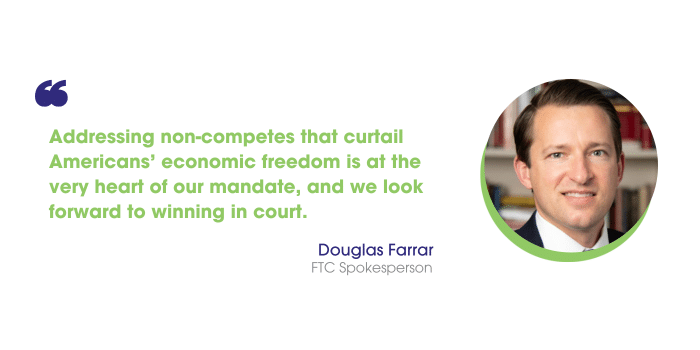The U.S. Chamber of Commerce has followed through on its promise to file a lawsuit against the Federal Trade Commission over its recent ban on employers imposing non-compete clauses on their employees.
- The lawsuit, which also has the Business Roundtable, Texas Association of Business and Longview Chamber of Commerce as plaintiffs, came just one day after the FTC’s 3-2 vote.
The suit seeks to prevent the ban, arguing that the FTC doesn’t have the authority to implement such a far-reaching rule.
“The sheer economic and political significance of a nationwide non-compete ban demonstrates that this is a question for Congress to decide, rather than an agency,” the U.S. Chamber of Commerce, which represents roughly three million companies, wrote in the lawsuit filed in the Eastern District of Texas.
“The economy as a whole will suffer as start-ups and small businesses are unable to prevent dominant firms from hiring their best employees and gaining access to their confidential information. This court should stop that effort in its tracks because the commission’s non-compete rule violates the law in numerous ways.”

In response to the lawsuit, the FTC maintains that it’s well within its right to pass such a ruling.
“Our legal authority is crystal clear,” FTC spokesperson Douglas Farrar told CNBC. “Addressing non-competes that curtail Americans’ economic freedom is at the very heart of our mandate, and we look forward to winning in court.”
Breaking Down The Ruling
Non-compete clauses are a contractual term between an employer and a worker that blocks the worker from working for a competing employer or starting a competing business, typically within a certain geographic area and period of time after the worker’s employment ends.
- The FTC’s ruling leaves existing non-competes with senior executives intact while banning future non-competes for top corporate officials.
- The rule is intended to go into effect 120 days after it is published in the Federal Register.
In February, PPAI Media listed non-compete clauses as one of the key employment areas to watch in 2024 after the FTC proposed the legislation that this ban initially stemmed from in January. Last year, Joshua White – then the head of strategy and general counsel at BAMKO and a member of the PPAI Board of Directors – wrote a column for PPAI Media arguing against non-compete contracts as a practice in promo and predicting this week’s outcome.
“The point here is not to challenge your opinion on non-competes,” White wrote. “I expect the FTC will take that issue out of your hands soon enough. My point is to challenge the way you think about people, culture and the role you play in shaping both.”
‘Undeniably Impactful’
Maurice Norris, PPAI’s public affairs manager, states plainly that the ruling has obvious implications for companies in the industry that have non-competes baked into their standard hiring process.
“This new rule from the FTC is undeniably impactful,” Norris says. “It doesn’t just mandate communications to current employees, but additionally requires companies to eliminate most existing non-competes, with some exceptions. The 120-day effective date is also approaching soon.”
Norris anticipates that a Congressional Review Act resolution will follow the FTC ruling in the near future.


